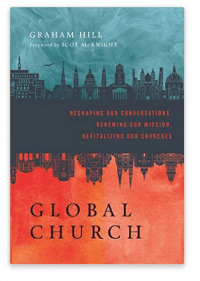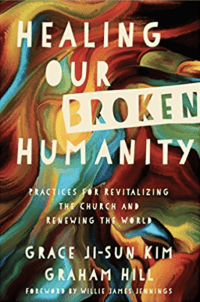7 Inspiring Women: Reta Halteman Finger

Reta Halteman Finger is an affiliate associate professor of New Testament at Eastern Mennonite University in Harrisonburg, Virginia.
Rediscovering the power of common meals
Reta Halteman Finger challenges the church to be a community of shared meals that confronts the racial, economic, and gender divisions in society.[1]
The daily meals of the Jesus movement, [and] the continuing agape supper tradition in house churches throughout the Greco-Roman world . . . should challenge us to consider the racial and economic divisions that so casually and maliciously structure our lives. They should help us see the Eucharist as more than a device to nurture one’s private, individualized relationship with God.
Luke 24:30–31 tells us that the couple who met Jesus on the road to Emmaus did not recognize him until they broke bread together. We too may not recognize Jesus unless we break bread with each other until all are satisfied and none are in need.
The book of Acts describes a remarkable community of shared goods and communal meals. Community, sharing, generosity, and witness go hand in hand in this early Jerusalem church. The early Jerusalem church ate together daily, and shared all things. Daily communal meals were embedded in a community of economic and resource sharing: a community of goods.
Sharing possessions, enjoying common meals, and breaking bread (the Lord’s Supper), were all deeply connected in the earliest Christian communities. In some ways, this reflected the ancient society in which the early church resided. Food and meals are cultural symbols. But, in other ways, these practices redefined and transformed such practices. Communal sharing overturned hierarchies. It reimagined common meals. It elevated women and the poor and the non-elite. And, it followed the patterns of life set down by Jesus.
Communal sharing is a particular challenge for our times. Western Christianity usually resists the community of goods that Acts 2 and 4 expresses. Western culture is materialistic, individualistic, and competitive. It prizes private, personal, and possessive ownership. There is “a middle-class bias against communal sharing.”[2]
Multinational and globalized forces seem to make communal sharing less desirable and achievable than ever. People live highly individualistic, consumeristic, and mobile lives. People are expected to strive and work hard, usually in an individualistic and competitive way, until they succeed. “Today, capitalization, mass production, technology and globalization have made the world of American Christians very different from the world of our Palestinian forebears.”[3]
All this makes the communal sharing described in Acts seem impossible to many people. Finger argues that all this also makes it much more urgent and necessary in our modern times. And she argues that a close examination of the biblical and theological material shows that communal sharing, in a variety of forms, is normative for the church. It is essential to the church’s identity, community, and witness. It reflects the practices and commitments of Jesus Christ.
Rediscovering the heart of the church
The crowd who gathered around Jesus on the hillside to listen to his Sermon on the Mount were a broken, marginalized, undignified, fringe, shabby group of people. But Jesus says something shocking to this group. The kingdom of God is among you! Blessed are you!
Why does Jesus call his church to be welcoming and compassionate? Why does the church give to the needy?
First, because God is generous, loving, and inclusive.
Second, because this church is itself a mixed bag of people: women, children, men, the poor, the sick, the socially marginalized, the unclean, the outcast, the foreigner, the “other”, and the excluded. These people gather around common meals as a symbol of their common life together, and of their solidarity, hope, and transformed social relationships.[4]
The people at the heart of the early church shaped its theology, community, and mission. These were the very same people Jesus focused on in his ministry – women, the poor, the sick, the outcast, the powerless, and the marginalized. These people weren’t just a part of the early church community – they were at the heart of the community. Women, the poor, the undesirable, those normally ignored by the religious establishment, and the socially marginalized shaped the theology, fellowship, service, discipleship, and mission of the early church in immeasurable ways. This was often done in homes and around meals. The church always loses its way when it ignores these voices and pushes them to its margins.
Rediscovering intentional community
Jesus reinvents the family.[5] He creates an intentional community. This community is usually expressed in small house churches. The early church was a community of open homes, economic sharing, communal meals, and fictive kin groups. Within this extended family, people met each other’s economic and social needs. These churches abolished acquisition of wealth and honor by patronage. “This is a redistribution—where the rich get poorer and the poor get richer, and relationships become radically equalized.”[6]
These fictive kin groups met daily in homes and around meals. They prized loyalty, love, faith, welcome, hospitality, hope, diversity, equality, truth-telling, and grace.
The early house churches adopted Jesus’ strategy for confronting and abolishing religious and social exclusivism.[7] Jesus instituted open table fellowship. In contrast to the religious, political, and social leaders of his age, Jesus welcomes everyone to the table. He welcomes prostitutes, tax-collectors, the sick, women, those with addictions, and the outcasts. He invites those who don’t meet religious or social regulations or standards. His enemies called him “a glutton and a drunkard.” But his inclusive meals showed people the nature of God, and the values of his kingdom.
The Jerusalem church enjoyed a daily commensality. They constructed this around Mediterranean culture, the example of the Essenes, the meal practices and personal instructions of Jesus, and the agape meal tradition.
On the one hand, they reflected their culture. On the other, they redefined communal meals and common purse around these things. They especially shaped their eating practices and redistribution of goods around the meal practices and special teachings of Jesus.
Reta Halteman Finger is clear. We can’t just import these practices into modern life. Like the ancient Christian community, we need to wrestle with what it means for us to share communal meals and common goods today, in our cultures and societies.[8]
Other posts in this series
Want more on Reta Halteman Finger? This blog post is an excerpt from Chapter 13 of my book “Salt, Light, and a City, Second Edition: Ecclesiology for the Global Missional Community: Volume 1, Western Voices.” You can get the book here.
Graham Hill
Graham Hill (PhD) teaches at Morling College in Sydney, Australia, and is the Founding Director of The GlobalChurch Project – www.theglobalchurchproject.com. He’s the author of “GlobalChurch: Reshaping Our Conversations, Renewing Our Mission, Revitalizing Our Churches” (IVP, 2016), and “Salt, Light, and a City, Second Edition: Ecclesiology for the Global Missional Community: Volume 1, Western Voices (Cascade, 2017).”
© 2017 All rights reserved.
Copying and republishing this article on other Web sites, or in any other place, without written permission is prohibited.
[2] Finger, Of Widows and Meals, 3.
[3] Finger, “Cultural Attitudes in Western Christianity Toward the Community of Goods in Acts 2 and 4,” 270.
[4] Finger, Of Widows and Meals, 7–11.
[5] Finger, “Open Homes and Fictive Kin Groups.”
[6] Finger, Ibid., 20.
[7] Finger, Of Widows and Meals, 184.
[8] Ibid., 280.
Want to get your hands on more, see our subscriptions
Books
Don’t forget to buy Graham Hill’s books:
- Global Church
- Salt, Light, and a City (second edition)
- Healing Our Broken Humanity



Comments: We’d love to hear your comments and reflections on this blog post!





